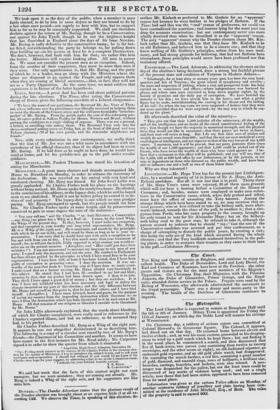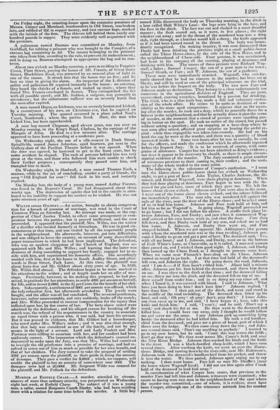be liftrtropnii#.
The Lord Chancellor is expected to remain at Brotrimm Hall until the 6th or 8th of January. Hilary. Term is appointed for Friday. the 11th of January; on which day the Noble Lord will resume his sittings at Westminster.
On Christmas day, a robbery of serious extent was committed at i Colonel Howard's, n Grosvenor Square. The Colonel, it appears, had dined out on that day. He returned home between eleven and twelve o'clock ; and, as was his usual custom, proceeded to his sleeping- room to wind up a gold watch which he kept there ; but not finding it in the usual place, he commenced a search, and then discovered that five 51. bank-notes, two purseS (one containing from twelve to twenty sovereigns, and the other seven or eight), an old-fashioned repeater, an embossed gold repeater, and an old gold plain watch, had disappeared. On extending the search further, a red box, containing a great number of gold, diamond, and emerald rings, rows of brilliants, a brilliant star, brooches, earrings, bracelets, and lockets, Were also missed. A mes- senger was despatched for the police, but not the least trace could be discovered of any marks of violence' being used; and not a single article, save those that had been stolen, appeared to have been removed from its usual place. Information was given at the various Police-offices on Monday, of another extensive -robbery -of- jewellery and- plate having been com- mitted at the residence of John Mitchell, Esq., of Bath. Vitt rant of the property is said to exceed 0001. On Friday night, the counting-house upon the extensive premises of Messrs. Cooper and Moreland, ironfounders in Old Street, was broken into, and robbed of 351. in copper money, and two canvass bags, marked with the initials of the firth. The thieves left behind them nearly one hundred pounds in copper. They were evidently well acquainted with the premises.
A. policeman named Beaman was committed on Monday, from Guildhall, for robbing a prisoner who was brought to the Compter, of a canvass bag containing 4s. 6d. The money belonging to the prisciner was taken from him, according to the rule, to prevent its embezzlement ; atictin doing so, Beaman attempted to appropriate the bag and its con- tents.
About two o'clock on Monday morning, a persm residing in Poppin's Court, Fleet Street, passing the house of Mr. Francis, of Great Surry Street, Blackfriars Road, was attracted by an unusual glare of light in one of the rooms. It struck him that the house was on fire ; and he lost no time in giving the alarm. An inspector of . the L division of police and policeman 69 repaired instantly to the house : on entering, they. heard the shrieks of a, female, and rushed up stairs ; where they found Mrs. Francis enveloped in flames, They extinguished the fire with all possible speed; and Mr. Seddon, a surgeon, was promptly in attendance ; but the unfortunate sufferer was so. severely burnt that she soon after expired. -
A man named Hayes, an Irishman, was so severely beaten and kicked, by a countryman of his own, on Christmas eve, that he expired on Tuesday morning. The quarrel occurred in a place called Noel's Court, Southwark ; where the parties lived. Hart, the man who kicked him, has been apprehended.
A poor boy named Chapman, aged eleven years, was run over on Monday evening, in the King's Road, Chelsea, by the carriage of the Marquis of Ailsa. He died in a few minutes after. The carriage appeared to have been proceeding at a moderate pace.
On Wednesday night, the son of a silk-weaver in Dunk Street, Spitalfields, named James Johnston, aged fourteen, got next to the Gallery-door of the Pavilion Theatre before it was opened. When the door was opened, he hastened to get to the front seats, but by some accident he slipped. The rush of persons behind him was very great at the time, and those who followed him were unable to check their further progress ; consequently they passed over him, and trampled him to death.
On Wednesday night, in Shadwell, a man named Thomas Nash, a seaman, while in the act of concluding, amidst a party of friends, the song "Old England for ever!" fell back in his seat, and instantly expired.
• On Monday last, the body of a young man, named Arthur Forster, was found in the Regent's Canal. He had disappeared about three Weeks' ago. The depression of spirits that led to the suicide is attri- buted to his inability to support his mother as lie wished. He was not quite nineteen years of age.
WILLES versus Gitrimer.—An action, brought to obtain compensa- tion for &breach of promise of marriage, was tried in the Court of Common Pleas on Saturday last. An attempt was made, at the sug-
gestion of Chief Justice Tindal, to effect some arrangement or com- promise between the parties ; but it proved ineffectual, and the case proceeded. It appeared that the plaintiff, Mrs. Wiles, was the widow of a distiller who resided formerly at Streatham. He was in good cir- cumstances at that time, and was visited by all the respectable people in the neighbourhood. He afterwards, however, got into difficulties, and was obliged to leave the country, on account of some discreditable paper transactions in which he had been implicated. The defendant, who was an opulent clergyman of the Church of England, was ac- quainted with Mr. and Mrs. Willes ; and learning that the latter was desirous of doing something to support her family, engaged her to re- side with him, and superintend his domestic affiiirs. She accordingly resided with him, first at his house in South Audley Street, and after- wards in Dean Street, Park Lane. At this time, the plaintiff was
about forty-five and Mr. Gildert about sixty years of age. In 1829,
Mr. Wilds died abroad: The defendant began to be more marked in his attentions to the widow ; and at length made her an offer of mar- riage. Previously,' however, to his making this proposal, he had pro-
mised; ingratitude for her attentions, to settle 400/. per annum on herself, for life, and to invest 2,000/. in the 31 per Cents for the benefit of her chil-
dren. Subsequently, a settlement of 300/. per annum was offered, which the lady refused at first, but afterwards acceded to. The jewels were bought, and the affair waiall but concluded. The reverend gentleman, however, rather unaccountably, and very suddealy, broke off the match;
riiid-Mrs. Willes proceeded to recover compensation for the injury thus inflicted upon her, by due course of law. The facts above stated were admitted by the defendant ; and his alleged reason for breaking off the match was, the.refusal of his acquaintances in the country to associate On equal terms with a person who, it was said, had been his servant. That it.was proved in evidence, that Mr. Gildert had a housekeeper, who acted under Mrs. Willes's orders ; and it was also clear enough, that that lady was considered as one of the family, and not by any means in the light of a servant. Lord and Lady Poulett and Mrs. Portman were willing to associate with her, and her conduct had been uniformly, correct. The impression which the defendant's counsel en- deavoured to make upon the Jury, was that Mrs. Willes had contrived to inveigle the old gentleman into a promise of marriage, and had re- solved to screw out of him as much as possible for her own benefit, and that of her children. The Jury seemed to take the proposal of settling 800/. per annum upon the plaintiff, as their guide in fixing the amount of damages. They gave a verdict for 3,0001.; which, we suppose, will enable the plaintiff to buy an annuity of somewhere near 300/. The damages were laid at 20,000/. Mr. Sergeant Wilde was counsel for the plaintiff, and Mr. Pollock for the defendant.























 Previous page
Previous page